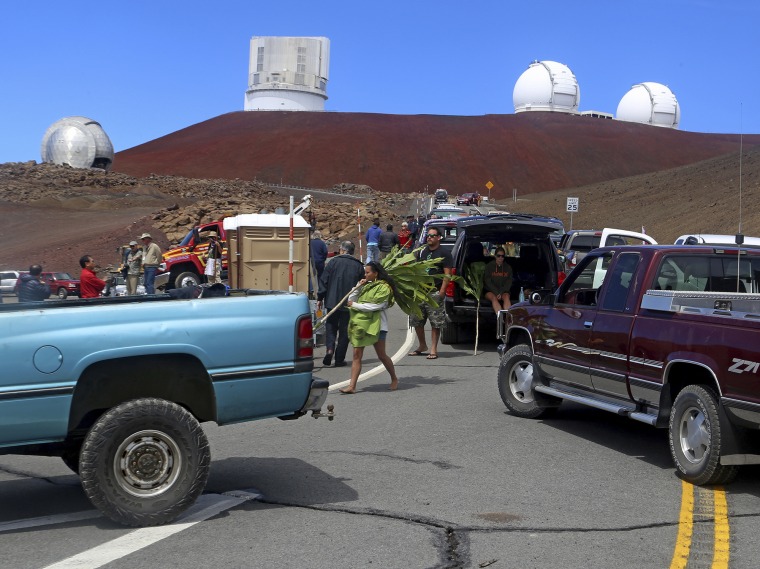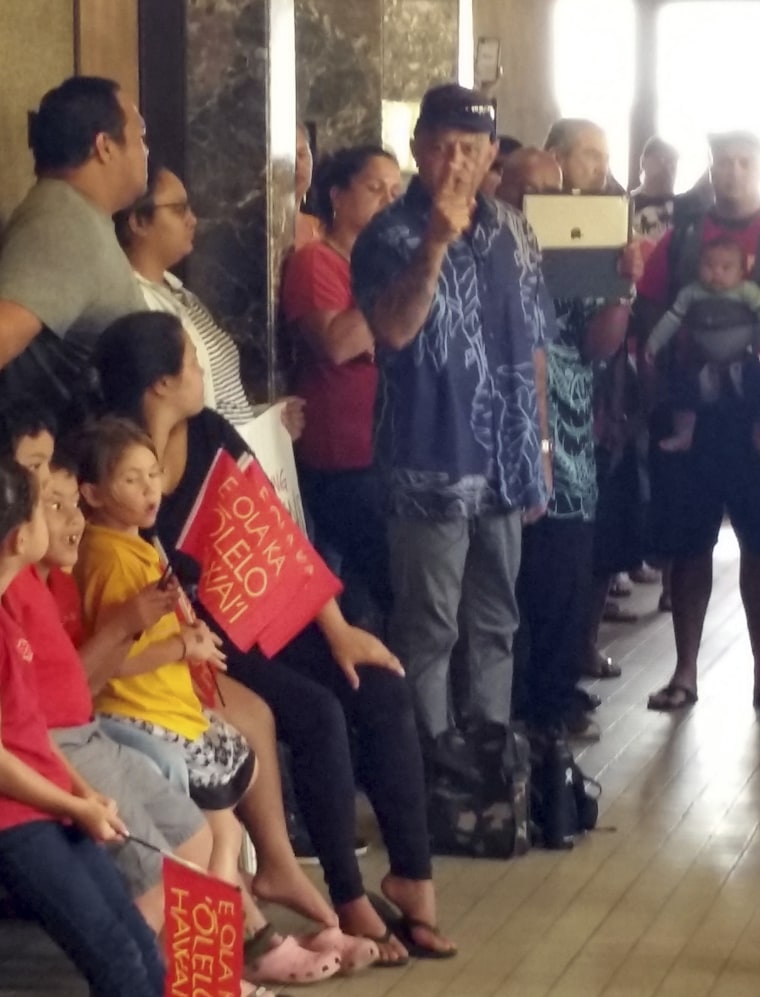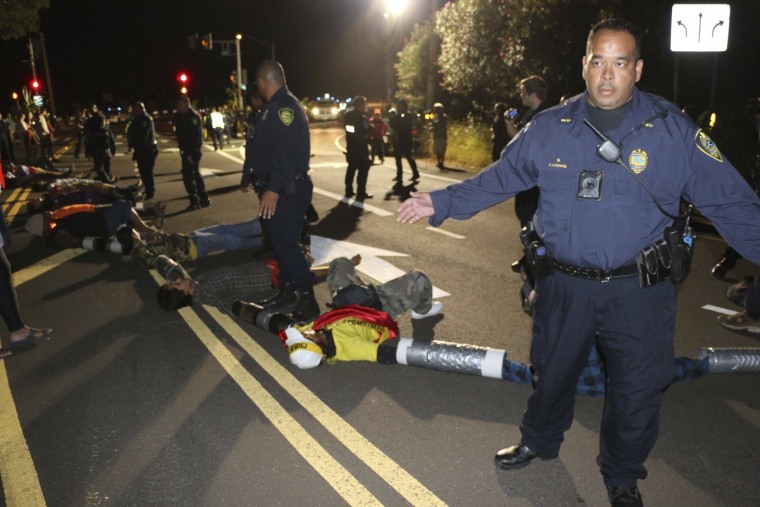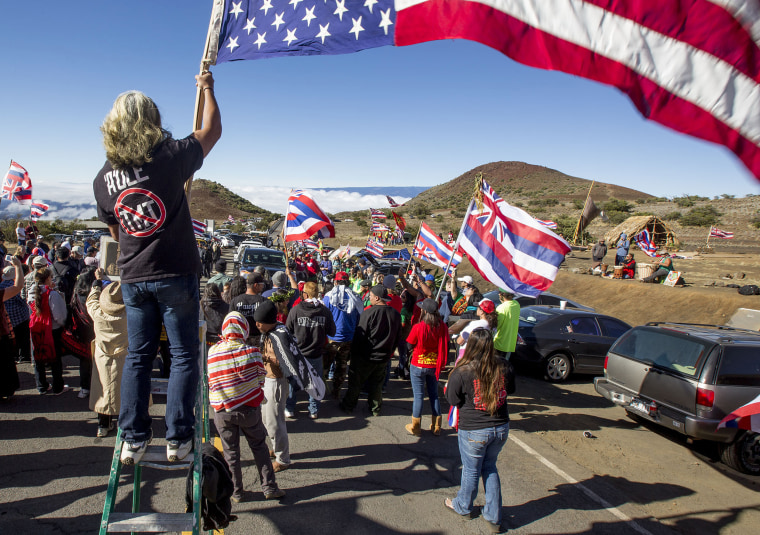Byron Cleeland was nervous the first time he appeared in a Hawaii courtroom.
It was 2011, and the lawyer of a young man from the state’s most western island of Niihau was concerned his client didn’t understand the English-language proceedings. Cleeland, an instructor at a charter school that works to strengthen the Niihau dialect of Hawaiian, was asked to help.
Because we are a resilient people, we are still here, with our language, our voice, our politics, and our aloha for our place and the world, we will be heard and not forced to use any language but the one of our choosing.
Cleeland said he got over his nerves quickly once the work began. “The interpreting part was easy for me because I've been involved with the Niihau community for the past 35 years and am pretty comfortable speaking the dialect,” the 75-year-old, who is currently Hawaii’s only certified Hawaiian language court interpreter and also goes by Hōkūlani, said.
Following that appearance, Niihau dialect speakers began asking Cleeland, who lives on the island of Kauai, for help when they had to appear in court. The number of requests jumped when he became a certified court interpreter in 2014, coming from other islands including Oahu and Maui.
After two recent high-profile court cases involving land considered sacred by some Native Hawaiians, Cleeland wrote to more than 100 language teachers asking them to get involved in interpreting, he said. Seven have registered for this year’s training to becoming certified interpreters.
While English and Hawaiian are both official state languages as defined in the constitution of the state Hawaii, court proceedings are conducted in English. Translators are provided for people with limited English proficiency, but in the past, Hawaiian interpreters were not required in court when parties also spoke English.
As increasing numbers of Native Hawaiians are choosing to testify in the language, the judiciary has wrestled with how to accommodate them and record their testimony.

In January, activist Kahookahi Kanuha was allowed to testify in Hawaiian with an interpreter in a case in which he was found not guilty of obstruction during protests of the Thirty Meter Telescope on Mauna Kea, a dormant volcano on the Big Island, according to the Hawaii Tribune-Herald.
But later that month, a judge issued a warrant for the arrest of Samuel Kaleikoa Ka‘eo, an associate professor of Hawaiian studies at the University of Hawai‘i Maui College, after Ka‘eo appeared in court but refused to identify himself in English, speaking in Hawaiian.

Ka‘eo was in court for misdemeanor charges stemming from a 2017 protest connected to the construction of a solar telescope on Haleakala, a volcano in Maui. The warrant was recalled the following day.
After the recall , Ka’eo said he felt the judge did not understand the movement to revitalize the Hawaiian language, NBC affiliate Hawaii News Now reported. "This is not just about language,” Ka’eo reportedly said. “This is a larger questions in which Hawaiians have been struggling to become visible within Hawaii and the world."
The Hawaii State Judiciary has since issued a new policy on Hawaiian language interpreters, stating that the “Judiciary will provide or permit qualified Hawaiian language interpreters to the extent reasonably possible when parties in courtroom proceedings choose to express themselves through the Hawaiian language.”

This increase in use of the Hawaiian comes decades after efforts started to keep the language from dying.
Following the overthrow of the Hawaiian monarchy in 1893, Hawaiian was banned in the state’s schools in 1896. The language nearly died out, according to the Hawaii Department of Education, and in 1978 it was made one of the official languages of the state.
The schools taught in Hawaiian were established in 1985.
As of 2013, 18,610 people speak the language, approximately 5.7 percent of the state’s population, according to a 2016 study of languages spoken at home by the state of Hawaii. Of those Hawaiian speakers, 3,010 speak English less than “very well.”
Court interpreter orientation workshops for 2018, a mandatory step for those seeking to become interpreters, began in February.
“The Judiciary would like to register as many interpreters proficient in all languages as possible, but especially in Pacific Island languages,” Jan Kagehiro, Hawaii State Judiciary communications and community relations director, said.
Members of the Hawaii Senate have also amended a bill that would have appropriated funds for the University of Hawai‘i at Hilo to translate the state constitution into Hawaiian after Ka‘eo's warrant was cancelled.
This is not just about language. This is a larger questions in which Hawaiians have been struggling to become visible within Hawaii and the world.
The amended bill, which is currently being reviewed by a committee, would also require courts to provide interpreter services if any party to a proceeding requests that the case be conducted in Hawaiian.
At a January hearing for the bill, testimony was often given in Hawaiian and translated into English, according to Hawaii News Now, with the station reporting that the testimony was at times “emotional and teary” as supporters expressed the importance of the language.
“Prior U.S. overthrow of our constitutional government in 1893 and the violation of international law by the United States, our language was utilized in the courts and the Hawaiian legislature to craft, bind, and debate legal issues,” Kamanamaikalani Beamer, an associate professor of Hawaiian studies at the University of Hawaiʻi at Mānoa, said. “Because we are a resilient people, we are still here, with our language, our voice, our politics, and our aloha for our place and the world, we will be heard and not forced to use any language but the one of our choosing.”
Follow NBC Asian America on Facebook, Twitter, Instagram and Tumblr.


